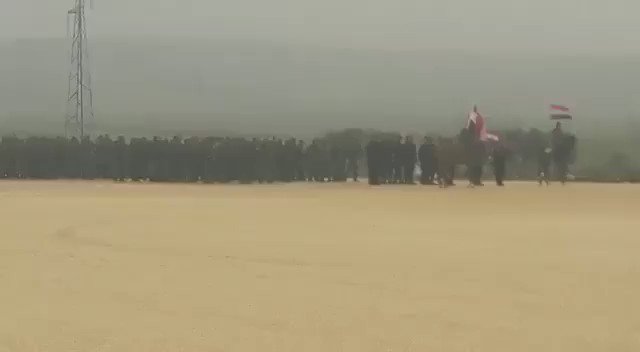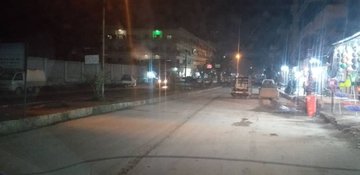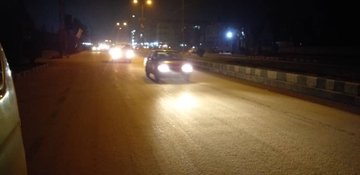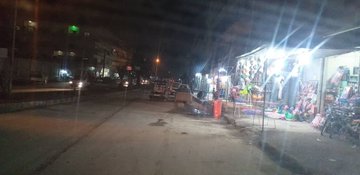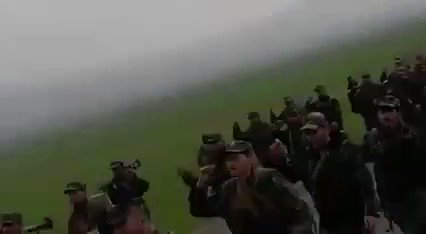US Pullout from Syria: Who Will Fill the Vacuum?
ΣΧΕΤΙΚΑ ΚΕΙΜΕΝΑ:
Τουρκική εισβολή στο Manbij:
Η επίθεση που ξεκίνησε αλλά σταμάτησε σε λίγες μόνο ώρες.
- "What Turkey is going to do is unleash holy hell on the Kurds. In the eyes of Turkey, they're more of a threat than ISIS. So this decision is a disaster." — U.S. Senator Lindsey Graham.
- Potential Turkish-Kurdish conflicts would further destabilize Syria and strengthen Russia. This point cannot be ignored. Turkey's and Iran's dependency on Russia in Syria will increase, as the trio further teams up to have a larger role in shaping Syria's future.
- It is understandable that abstaining from the role of the world's policeman may look consistent with Trump's pre-election pledge to "Make America Great Again." Nevertheless, caution is needed here: Leaving the "policing" job in the world's most volatile and turbulent parts to un-free regimes such as Russia, China, Iran and Turkey could also damage the quest of America and others in the free world to become great again -- and to remain free. The free world simply does not have the luxury -- even in remote geographical areas -- of allowing security to be policed by un-free state and non-state actors.
U.S. President Donald Trump's optimism about a potential Turkish military campaign to finish off ISIS looks woefully premature. Trump taking seriously Turkish President Recep Tayyip Erdoğan's pledge to "eradicate whatever is left of ISIS" is also problematic. ISIS and some of its offshoots are Erdoğan's former Islamist allies. Pictured: Trump and Erdoğan talk at the NATO Summit in Brussels, Belgium on July 11, 2018. (Photo by Sean Gallup/Getty Images)
U.S. President Donald Trump's unexpected decision to pull U.S. troops from Syria (and Afghanistan) was music to Turkish ears. Turkish President Recep Tayyip Erdoğan called it "the clearest and most encouraging statement" from Washington.
Foreign Minister Mevlüt Cavuşoğlu welcomed Trump's abrupt decision to withdraw all 2,000 U.S. troops from northern Syria. Defense Minister Hulusi Akar vowed that that Syrian Kurdish fighters whom Turkey considers as top regional security threat, would soon be "buried in the trenches that they dig."
The way Trump made that decision has also given new ammunition to Turkey's pro-Erdoğan media to portray the decision as "Erdoğan's victory." The media, in Turkey and abroad, widely reported that Trump decided on the pullout after a Dec. 14 telephone conversation with Erdoğan. According to Washington's official account of the conversation, the two leaders had "agreed to continue coordinating to achieve our respective security objectives in Syria."
Long before Trump decided in favor of troop withdrawal, Turkey had been threatening a cross-border military operation against U.S, allies, the Kurds, in Syria. Although Ankara pledged maximum care to avoid clashes with the U.S. troops some observers feared an unwanted Turkish-US military conflict. Turkey's security services had long been supplying military HQ with loads of intelligence from Arab, Kurdish and mixed population locations in northern Syria. The Turkish Air Force conducted airstrikes on Kurdish strongholds in neighboring Iraq. The Turkish military also massed troops near a town on the Syrian border, although Erdoğan seemed to agree to a delay in his planned incursion into Syrian territory, the third such operation in two years.
Now what? In its official narrative, Ankara could eradicate the remnants of the Islamic State group from Syria with just logistical help from Washington. Erdogan has openly said that military operations would also target Syrian Kurdish militants from the People's Defense Units YPG), the military wing of the Democratic Union Party (PYD) which Turkey says is an offshoot of the PKK, a Kurdish militant group that has been fighting Turkey for autonomy or secession since 1984. Turkey, the U.S. and European Union have long designated the PKK as a terrorist organization. With the upcoming U.S. withdrawal, Turkey has won the chance militarily to challenge YGP/PYD without the risk of clashing with the U.S. troops. It is not known yet if Erdoğan, in return for securing the U.S. pullout, pledged not to engage in an all-out war with the Kurds. But Kurds remain nervous.
Syrian Democratic Forces (SDF), the main military group that allied with the U.S. in the fight against Islamic State (and made up of mainly YPG fighters), says it would have to withdraw fighters from the battle against radical jihadists to protect its borders in the event of a Turkish attack. "Fighting [Islamic] terrorism will be difficult because our forces will be forced to withdraw from the Deir el-Zor front to take up positions on the border with Turkey to stop an eventual attack," Elham Ahmed, the co-chair of the SDF's political wing, said in Paris.
"What Turkey is going to do is unleash holy hell on the Kurds," Sen. Lindsey Graham, R-S.C. said on the Senate floor. "In the eyes of Turkey, they're more of a threat than ISIS (IS). So this decision is a disaster." Trump's decision complicates the Syrian theater more than just opening up a new battleground between Kurdish fighters and Turkish troops.
In any Turkish operation Tel Abyad promises to be an imminent target. Militarily speaking Turkey will wish to divide the main block of Kurdish territory into two creating a major crevice of land between Manbij and Kobane in the West and Qamishli and Hasaka in the East. In 2011 around 70% of the population of Tel Abyad was Arab (and some 25% Kurdish). The U.S. withdrawal will mean flocks of Arab fighters who were trained at military camps in Turkey, returning to the Arab-Kurdish zone to fight as Turkish proxies, fueling an Arab-Kurdish, in addition to a Turkish-Kurdish fighting. Most Arab tribes, most notably Jamilah and Bou Jarada, remain loyal to Turkey but had in the past also supported IS. That risk highlights a major down side of Trump's plan.
Backed militarily by Turkey and returning to northern Syria some Arab tribes may be exposed to the risk of "re-recruitment" into potentially new radical Islamist groups. IS may have largely lost its institutional identity but its fighters have not disappeared from the earth. Their tactical (anti-Kurdish) alliances with Turkey-backed Arab militants may lead to new, longer-term alliances, creating various IS-like groups with various new banners and brands. That being the new setting in northern Syria, Basher al-Assad, Syria's Russian-backed dictator, may see it totally fit to encourage new jihadists in order to win an upper hand in the "political process" (the constitutional reform process) that will theoretically shape the future of his country.
The Syrian theatre is too complex to feature a zero-sum game. The state and non-state actors that cheered Trump's decision to withdraw are: Erdoğan's Turkey, which wants to build a Sunni, Islamist and pro-Turkey administration in northern Syria; Russia, whose now-augmented power in Syria will also augment Assad, and Iran, which will now gain new advances in Syria.
Potential Turkish-Kurdish and Arab-Kurdish conflicts would further destabilize Syria and strengthen Russia. This point cannot be ignored. Turkey's and Iran's dependency on Russia in Syria will increase, as the trio further teams up to have a larger role in shaping Syria's future.
On December 19, foreign ministers from the three countries met in Geneva to cement their increasing convergences over Syria. Russia must be especially pleased to have a new opportunity to weaken even further Turkey's deeply problematic ties with its Western and NATO partners. Potential Turkish-Kurdish and Arab-Kurdish conflicts would further destabilize Syria and strengthen Russia. This is a point that cannot be ignored.
The U.S. move also could turn out to be a death-blow on Washington's efforts to keep Tehran from further establishing itself in Syria and building a Shia land bridge all the way to Lebanon and therefore threaten the security not only of Israel, but of the entire Mediterranean region.
In September, speaking on the margins of the UN convention, Trump's National Security Advisor John Bolton said that the U.S. forces would remain in Syria until Iran and its proxies departed. With its numerous potentially serious drawbacks, Trump's decision deeply discredits the U.S. administration, its key figures -- and Trump himself.
The U.S. president said on Twitter December 23 that Turkey promised it would ensure that ISIS is defeated in Syria. He said:
Foreign Minister Mevlüt Cavuşoğlu welcomed Trump's abrupt decision to withdraw all 2,000 U.S. troops from northern Syria. Defense Minister Hulusi Akar vowed that that Syrian Kurdish fighters whom Turkey considers as top regional security threat, would soon be "buried in the trenches that they dig."
The way Trump made that decision has also given new ammunition to Turkey's pro-Erdoğan media to portray the decision as "Erdoğan's victory." The media, in Turkey and abroad, widely reported that Trump decided on the pullout after a Dec. 14 telephone conversation with Erdoğan. According to Washington's official account of the conversation, the two leaders had "agreed to continue coordinating to achieve our respective security objectives in Syria."
Long before Trump decided in favor of troop withdrawal, Turkey had been threatening a cross-border military operation against U.S, allies, the Kurds, in Syria. Although Ankara pledged maximum care to avoid clashes with the U.S. troops some observers feared an unwanted Turkish-US military conflict. Turkey's security services had long been supplying military HQ with loads of intelligence from Arab, Kurdish and mixed population locations in northern Syria. The Turkish Air Force conducted airstrikes on Kurdish strongholds in neighboring Iraq. The Turkish military also massed troops near a town on the Syrian border, although Erdoğan seemed to agree to a delay in his planned incursion into Syrian territory, the third such operation in two years.
Now what? In its official narrative, Ankara could eradicate the remnants of the Islamic State group from Syria with just logistical help from Washington. Erdogan has openly said that military operations would also target Syrian Kurdish militants from the People's Defense Units YPG), the military wing of the Democratic Union Party (PYD) which Turkey says is an offshoot of the PKK, a Kurdish militant group that has been fighting Turkey for autonomy or secession since 1984. Turkey, the U.S. and European Union have long designated the PKK as a terrorist organization. With the upcoming U.S. withdrawal, Turkey has won the chance militarily to challenge YGP/PYD without the risk of clashing with the U.S. troops. It is not known yet if Erdoğan, in return for securing the U.S. pullout, pledged not to engage in an all-out war with the Kurds. But Kurds remain nervous.
Syrian Democratic Forces (SDF), the main military group that allied with the U.S. in the fight against Islamic State (and made up of mainly YPG fighters), says it would have to withdraw fighters from the battle against radical jihadists to protect its borders in the event of a Turkish attack. "Fighting [Islamic] terrorism will be difficult because our forces will be forced to withdraw from the Deir el-Zor front to take up positions on the border with Turkey to stop an eventual attack," Elham Ahmed, the co-chair of the SDF's political wing, said in Paris.
"What Turkey is going to do is unleash holy hell on the Kurds," Sen. Lindsey Graham, R-S.C. said on the Senate floor. "In the eyes of Turkey, they're more of a threat than ISIS (IS). So this decision is a disaster." Trump's decision complicates the Syrian theater more than just opening up a new battleground between Kurdish fighters and Turkish troops.
In any Turkish operation Tel Abyad promises to be an imminent target. Militarily speaking Turkey will wish to divide the main block of Kurdish territory into two creating a major crevice of land between Manbij and Kobane in the West and Qamishli and Hasaka in the East. In 2011 around 70% of the population of Tel Abyad was Arab (and some 25% Kurdish). The U.S. withdrawal will mean flocks of Arab fighters who were trained at military camps in Turkey, returning to the Arab-Kurdish zone to fight as Turkish proxies, fueling an Arab-Kurdish, in addition to a Turkish-Kurdish fighting. Most Arab tribes, most notably Jamilah and Bou Jarada, remain loyal to Turkey but had in the past also supported IS. That risk highlights a major down side of Trump's plan.
Backed militarily by Turkey and returning to northern Syria some Arab tribes may be exposed to the risk of "re-recruitment" into potentially new radical Islamist groups. IS may have largely lost its institutional identity but its fighters have not disappeared from the earth. Their tactical (anti-Kurdish) alliances with Turkey-backed Arab militants may lead to new, longer-term alliances, creating various IS-like groups with various new banners and brands. That being the new setting in northern Syria, Basher al-Assad, Syria's Russian-backed dictator, may see it totally fit to encourage new jihadists in order to win an upper hand in the "political process" (the constitutional reform process) that will theoretically shape the future of his country.
The Syrian theatre is too complex to feature a zero-sum game. The state and non-state actors that cheered Trump's decision to withdraw are: Erdoğan's Turkey, which wants to build a Sunni, Islamist and pro-Turkey administration in northern Syria; Russia, whose now-augmented power in Syria will also augment Assad, and Iran, which will now gain new advances in Syria.
Potential Turkish-Kurdish and Arab-Kurdish conflicts would further destabilize Syria and strengthen Russia. This point cannot be ignored. Turkey's and Iran's dependency on Russia in Syria will increase, as the trio further teams up to have a larger role in shaping Syria's future.
On December 19, foreign ministers from the three countries met in Geneva to cement their increasing convergences over Syria. Russia must be especially pleased to have a new opportunity to weaken even further Turkey's deeply problematic ties with its Western and NATO partners. Potential Turkish-Kurdish and Arab-Kurdish conflicts would further destabilize Syria and strengthen Russia. This is a point that cannot be ignored.
The U.S. move also could turn out to be a death-blow on Washington's efforts to keep Tehran from further establishing itself in Syria and building a Shia land bridge all the way to Lebanon and therefore threaten the security not only of Israel, but of the entire Mediterranean region.
In September, speaking on the margins of the UN convention, Trump's National Security Advisor John Bolton said that the U.S. forces would remain in Syria until Iran and its proxies departed. With its numerous potentially serious drawbacks, Trump's decision deeply discredits the U.S. administration, its key figures -- and Trump himself.
The U.S. president said on Twitter December 23 that Turkey promised it would ensure that ISIS is defeated in Syria. He said:
"President Erdoğan of Turkey has very strongly informed me that he will eradicate whatever is left of ISIS in Syria.... and he is a man who can do it plus, Turkey is right 'next door.' Our troops are coming home!"
Trump's optimism about a potential Turkish military campaign to finish off ISIS looks woefully premature. Trump taking seriously Erdoğan's pledge to "eradicate whatever is left of ISIS" is also problematic. ISIS and some of its offshoots are Erdoğan's former Islamist allies. The lines of alliance and hostility are blurred but always open to further change.
Erdoğan's word is fine -- but probably not good enough. First, Erdoğan's primary motive to send the Turkish army into Syria is not to fight jihadists. He may even have less appetite to fight jihadists who may come up under non-ISIS banners. Some groups of jihadists (aspiring but not yet ISIS 2.0) are his allies and proxies. It would have been wiser if Trump got assurances that Erdoğan will finish off every Islamist/jihadist group in Syria, not just what remains of ISIS. If one can actually trust Erdoğan's word, that is. Erdogan has a history of not being reliable.
It is understandable that abstaining from the role of the world's policeman may look consistent with Trump's pre-election pledge to "Make America Great Again." Nevertheless, caution is needed here: Leaving the "policing" job in the world's most volatile and turbulent parts to un-free regimes such as Russia, China, Iran and Turkey could also damage the quest of America and others in the free world to become great again -- and to remain free. The free world simply does not have the luxury -- even in remote geographical areas -- of allowing security to be policed by un-free state and non-state actors.
Erdoğan's word is fine -- but probably not good enough. First, Erdoğan's primary motive to send the Turkish army into Syria is not to fight jihadists. He may even have less appetite to fight jihadists who may come up under non-ISIS banners. Some groups of jihadists (aspiring but not yet ISIS 2.0) are his allies and proxies. It would have been wiser if Trump got assurances that Erdoğan will finish off every Islamist/jihadist group in Syria, not just what remains of ISIS. If one can actually trust Erdoğan's word, that is. Erdogan has a history of not being reliable.
It is understandable that abstaining from the role of the world's policeman may look consistent with Trump's pre-election pledge to "Make America Great Again." Nevertheless, caution is needed here: Leaving the "policing" job in the world's most volatile and turbulent parts to un-free regimes such as Russia, China, Iran and Turkey could also damage the quest of America and others in the free world to become great again -- and to remain free. The free world simply does not have the luxury -- even in remote geographical areas -- of allowing security to be policed by un-free state and non-state actors.
* Burak Bekdil, one of Turkey's leading journalists, was recently fired from the country's most noted newspaper after 29 years, for writing in Gatestone what is taking place in Turkey. He is a Fellow at the Middle East Forum.
Τουρκική εισβολή στο Manbij:
Η επίθεση που ξεκίνησε αλλά σταμάτησε σε λίγες μόνο ώρες.
Το μικρότερο κακό από τα δύο χρειάστηκε τελικά να επιλέξουν οι Κούρδοι της Συρίας μετά την αιφνιδιαστική απόφαση του Αμερικανού Προέδρου Τραμπ να διατάξει την απόσυρση των αμερικανικών στρατευμάτων από τις κουρδικές περιοχές και να αφήσουν τους Κούρδους και τους Άραβες συμμάχους στα νύχια των Τούρκων οι οποίοι έχουν ήδη διατυπώσει την κεντρική ιδέα της πολιτικής τους για την βόρεια Συρία που περιγράφεται από μία λέξη Εθνοκάθαρση.
Πιο συγκεκριμένα με βάση τις πληροφορίες που έρχονται από το πεδίο από τα εδάφη της επαρχίας Manbij οι κουρδικές δυνάμεις και η ηγεσία αυτών στην περιοχή αυτή συμφώνησαν με την κυβέρνηση Άσαντ την παραχώρηση του στρατιωτικού ελέγχου της περιοχή του Manbij ώστε να αποτραπεί η προέλαση των παραστρατιωτικών δυνάμεων των τζιχαντιστών συμμάχων των Τούρκων καθώς και των δυνάμεων Τουρκικού Στρατού και πιο συγκεκριμένα της 28ης ΜΚ ΤΑΞ, της 2ης Ταξιαρχίας Ειδικών Δυνάμεων από το Μπόλου που εδώ και αρκετές ημέρες ετοιμάζονται για μια μαζική εισβολή στα κουρδικά εδάφη από διαφορετικά σημεία των συνόρων.
Η απόφαση αυτή έρχεται τη στιγμή που υπό την πίεση του διεθνούς παράγοντα (Ρωσία και Γαλλία) η Άγκυρα αναγκάστηκε χτες να σταματήσει 4 ώρες αφότου είχε αρχίσει την αναγνωριστική επίθεση που οι τζιχαντιστές του Ελεύθερου Συριακού Στρατού, της οργάνωσης Ahrar al-Sharqiya πρώην μέλη της Al Qaeda, είχαν εξαπολύσει στην γραμμή αντιπαράθεσης προερχόμενοι από την κατεχόμενοι από τους Τούρκους συριακή πόλη Jarabalus.
Το απόγευμα της ιδίας ημέρας τουλάχιστον 2.000 άνδρες των Επίλεκτων Δυνάμεων του στρατού της Συρίας εισήλθαν στην επαρχία του Manbij από την περιοχή Al-Arimah με δύο άρματα μάχης, πυροβολικό και 40 οχήματα πολιτικού τύπου και στρατιωτικά φορτηγά.
Σύμφωνα με προχθεσινές πληροφορίες, χθες 26 Δεκεμβρίου, αναμενόταν η είσοδος στα εδάφη που ελέγχου οι Κούρδοι δυτικά του Ευφράτη, ανδρών της Δύναμης των «Τίγρεων» του Συριακού Στρατού, μιας επίλεκτης μονάδας που αναλαμβάνει δύσκολες αποστολές, της Ταξιαρχίας «Αετοί της Raqqa» και της 1ης Μεραρχίας του Συριακού Στρατού.
Η επιχείρηση αυτή όπως φαίνεται γίνεται με τις ευλογίες της Μόσχας η οποία πάντοτε επεδίωκε την ομοσπονδοποίηση της Συρίας, μέσα από την ένταξη των Κουρδικών περιοχών στον κορμό του νέου Συριακού κράτους και την αποφυγή οποιασδήποτε λύσης που περιλαμβάνει τη δημιουργία ανεξάρτητων κρατιδίων.
Η ρωσική πρόταση έχει διατυπωθεί εδώ και περίπου δύο χρόνια και περιλαμβάνει την καντονοποίηση της Συρίας, σύμφωνα με την φυλετική και θρησκευτική διαφοροποίηση των πληθυσμών, με την εφαρμογή ενός δημοκρατικού αντιπροσωπευτικού συστήματος διακυβέρνησης ίσων δικαιωμάτων και υποχρεώσεων και την εκλογή ενός ηγέτη κοινής αποδοχής που θα μπορούσε να κρατήσει τη χώρα ενωμένη.
Για τον λόγο αυτό, η Μόσχα μέσω της εκπροσώπου Τύπου του υπουργείου Εξωτερικών ξεκαθάρισε την θέση της Ρωσίας σύμφωνα με την οποία, «οι συριακές αρχές πρέπει να θέσουν υπό τον έλεγχο τους τα εδάφη από όπου θα αποχωρήσουν οι Αμερικανοί. Ο έλεγχος των περιοχών από όπου αποσύρονται οι ΗΠΑ να αφεθεί στην συριακή κυβέρνηση».
Ουσιαστικά με αυτή την ανακοίνωση η Μόσχα στέλνει ένα ξεκάθαρο μήνυμα στην Άγκυρα ότι δεν γίνεται οι τουρκικές και συμμαχικές τους δυνάμεις να εισβάλλουν στα κουρδικά εδάφη τα οποία θα πρέπει να ενταχτούν πάλι στον κορμό του Συριακού κράτους κάτι που οι Κούρδοι φαίνεται να αποδέχτηκαν.
Από την άλλη πλευρά η Μόσχα δεν πρόκειται να παράσχει αεροπορική υποστήριξη σε όποια επιχείρηση του Συριακού Στρατού στα κουρδικά εδάφη της Β. Συρίας αλλά αντιθέτως θα επιτρέψει την αξιοποίηση των πυροβολαρχιών S-300V4 (SA-23) που φέρεται να διαθέτει αντιβαλλιστικές και αντιαεροπορικές ικανότητες με εμβέλεια έως 400 χιλιόμετρα ώστε να δημιουργηθεί μια ζώνη απαγόρευσης πτήσεων στην βόρεια Συρία σύμφωνα με ανακοίνωση της Συριακής Αεράμυνας.
Για την περαιτέρω ενίσχυση αυτού του μέτρου οι Σύριοι πρόκειται να μεταφέρουν στα εδάφη του Manbij και στοιχεία του αντιαεροπορικού συστήματος Buk-M2Ε (SA-17 Grizzly) το οποίο έχει σχεδιαστεί για την αντιμετώπιση αεροσκαφών, ελικοπτέρων και πυραύλων σε απόσταση μέχρι και 45 χλμ.
Πάντως η εξέλιξη της μετακίνησης των συριακών στρατευμάτων στα ελεγχόμενα από τους Κούρδους εδάφη δυτικά του Ευφράτη εξελίσσεται ομαλά και ήδη κουρδικές δυνάμεις κινήθηκαν προς την περιοχή Taiha για να συναντήσουν το Συριακό Στρατό, ενώ πληροφορίες αναφέρουν ότι μια Ρωσική Αντιπροσωπεία έχει ήδη επισκεφτεί την πόλη Manbij.
Επιπλέον, σημαντικό ρόλο φαίνεται να παίζει την τελευταία στιγμή και η Αίγυπτος αφού στελέχη των Αιγυπτιακών Στρατιωτικών Μυστικών Υπηρεσιών πρόκειται να ταξιδέψουν στη Δαμασκό για να συμβάλουν στην επίτευξη συμφωνίας μεταξύ της κυβερνήσεως του Άσαντ και των Κούρδων για το μέλλον των εδαφών που οι τελευταίοι ελέγχουν.

27/12/2018Του Γιώργου Τσιμπούκη




